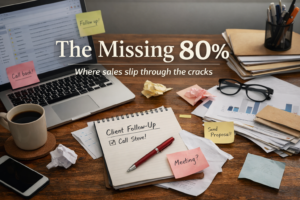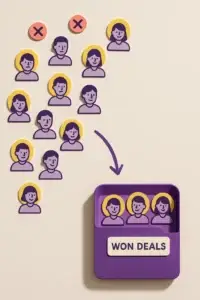Introduction
Sales notes are a crucial aspect of prospecting, especially later in the customer journey when your contact becomes more frequent and more direct. What you keep note of can make the difference between a closed sale or a missed opportunity, because those interactions help you understand how to sell to that prospect.
Keeping your notes safe should be a priority. But we don’t always make it easy for ourselves. So how do you make it easier? Why should you look after your sales notes, and how can you achieve this?
They Help Your Organisation
Here, I’m talking about organisation in both meanings of the word. First: how you organise yourself. Your brain will never keep all your notes stored to remember whenever—it genuinely can’t. Noting down your interactions will improve the quality of conversations from there on out.
Secondly: the benefits of using sales notes can be felt across your business. Not only does it help improve your chance of a sale, but sales notes help provide the evidence for the prospect journey, so your team know how to approach a similar prospect in the future.
They Help You Appeal to Your Prospect
Sales notes help you note down the things you remember, and the things you won’t—but the act of writing, or typing, helps reinforce the ideas you are noting down. This benefits your communication with the prospect, as they appreciate not needing to remind you on certain points, such as the pain they’re going through. They value the effort put into the conversation, and it makes you appeal to them as a real, viable option that can do right by them.
Retaining more information, whether by memory or by physical evidence, means you can, on balance, have a more productive conversation with your prospect, as you can concentrate on the things that matter instead of trying to catch up.
Overwriting or Losing Sales Notes?
Not keeping up with your sales notes can present real problems. Most importantly, it means losing vital information!
Where you store those notes makes a huge difference to how successful you are at keeping your notes stored. For example, in Excel you’re always at risk of overwriting your own notes. That isn’t a design flaw from Excel; it’s a design feature, but clearly not one that helps users when it comes to sales notes! It shows that you should have the technology that works with you, not despite you.

How to Protect Your Sales Notes
1. Make It a Habit
Making successful business methods a habit in your work life has the benefit of instilling, and standardising, a better success rate—and ultimately, it helps you grow as a business. If you’re not already jotting down notes during and/or after a follow up, you should be. The more comfortable you can get with the process, the better quality your notes will become, which means you can improve your efficiency and make the most of your time.
2. Keep Each Other Informed
Make sure you and your team are on board with where you keep your notes—especially if that means you’re bringing in a new sort of technology, like a CRM. Also make sure that they use it—there’s nothing worse than needing something you can’t reach!
Having your notes in an accessible place allows you to find your notes easily, and keeps everyone in the business on the same page. You reduce time spent on bringing others up to speed, freeing you—and them—to complete other tasks. As well as this, you reduce the risk of bombarding one prospect with follow ups.
This is the problem AIM Internet were finding over their multiple spreadsheets. However, using popcorn gave them a coordinated organisation, so everyone knew what was going on for their prospect—which you can read here.
3. Time-Stamp Your Notes
Keeping track of your notes can be aided by time-stamping them. Putting a time stamp on gives you evidence that you’ve done it—always great when trying to establish a habit—to yourself and to other people. Additionally, it can give the notes helpful context from the conversation that could’ve been missed otherwise, explaining your day and your prospect’s behaviour. This can inform the best time to next follow up, or structure your day around the next contact with your prospect.
4. Have All Your Data in One Place
Of all the ways to protect your sales notes, the best one is to have your data is one place. And if you need to have the suitable tool that is designed to accommodate for sales notes, you can’t really beat a CRM. These notes can be attached to a contact and aren’t at risk of losing or overwriting notes, because it requires a separate action. Instead, adding a note is easy, reducing that risk further.
Because it’s attached to your CRM, you can see how your prospect fits into your sales pipelines; how similar they are to other prospects; how they’re behaving in campaigns. Simply put—your notes are a vital part of the sum, so you can see the bigger prospecting picture.

popcorn’s Sales Notes
popcorn’s sales notes are a vital part of the CRM, not least because it focuses only on the essential tools that a small business needs. As such, popcorn’s approach towards sales notes is about making them accessible.
As a contact popup can be accessed in just one click, the contact’s notes have been put on contact profiles to make them easy to reach, and easy to view. Time stamps are also built into the note tool automatically, providing that context for you or whoever needs it. Crucially, these notes stay as separate objects, so unless you deliberately click into the note to edit it, there is no chance of overwriting your notes.
Adding a note is simple, central—and quick. You can see how our note tool holds up to HubSpot’s by watching our real-time comparison here.
Enjoyed this post? Comment below or read through our blog for more lead management and CRM tips, especially for small businesses.










